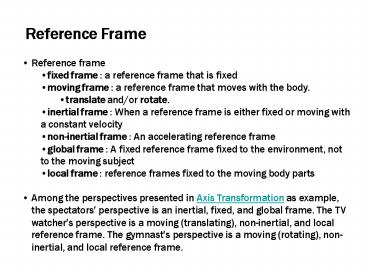Reference Frame - PowerPoint PPT Presentation
1 / 12
Title:
Reference Frame
Description:
inertial frame : When a reference frame is either fixed or ... Euler Angle. 1st rotation about. 2st rotation about. 3rd rotation about. Bryant (Cardan) Angle ... – PowerPoint PPT presentation
Number of Views:122
Avg rating:3.0/5.0
Title: Reference Frame
1
Reference Frame
- Reference frame
- fixed frame a reference frame that is fixed
- moving frame a reference frame that moves with
the body. - translate and/or rotate.
- inertial frame When a reference frame is either
fixed or moving with a constant velocity - non-inertial frame An accelerating reference
frame - global frame A fixed reference frame fixed to
the environment, not to the moving subject - local frame reference frames fixed to the
moving body parts - Among the perspectives presented in Axis
Transformation as example, the spectators'
perspective is an inertial, fixed, and global
frame. The TV watcher's perspective is a moving
(translating), non-inertial, and local reference
frame. The gymnast's perspective is a moving
(rotating), non-inertial, and local reference
frame.
2
The term "coordinate system" is slightly
different from "reference frame". The coordinate
system determines the way one describes/observes
the motion in each reference frame. Two types of
coordinate systems are commonly used in
biomechanics the Cartesian system and the polar
system. See Coordinate Systems for details of
these coordinate systems. One can describe a
motion differently in the same perspective
depending on the coordinate system employed.
Figure 1 shows examples of different reference
frames used to describe the human body motion.
One can easily define a local reference frame for
each body segment.
Figure 1
3
Axis Rotation Matrices
- Two different reference frames
- XY vs X'Y
- Vector r in Fig. 1 can be expressed as (x, y) in
XY system, or (x', y') in X'Y' system. - Geometric relationships between xy and x'y'
1
4
Expanding 1 to 3 dimensions
2
the axis rotation matrix for a rotation about
the Z axis
5
- Similarly for the rotations about the X and the Y
axis,
3
4
- Essential in developing the concept of the
Eulerian/Cardanian angles - See Eulerian Angles for the details. The rotation
matrices fulfill the requirements of the
transformation matrix. - See Transformation Matrix for the details of the
requirements.
6
Axis Rotation vs. Vector Rotation
- In Fig. 2, the vector rather than the axes was
rotated about the Z axis by f. This is called the
vector rotation. - In other words, vector r1 was rotated to r2 by
angle f.
5
since
6
where r length of the vector, a the angle r1
makes with the X axis.
7
Expanding 5 to 3-dimension
7
8
Similarly,
8
9
From 2 - 4 and 7 - 9
10
- Vector rotation is equivalent to the axis
rotation in the opposite direction. - One should not be confused by the axis rotation
and the vector rotation. - In vector transformation, the axis rotation
matrices should be used instead of the vector
rotation matrices because vector transformation
means change in the perspective.
9
Euler Angle
1st rotation about
2st rotation about
3rd rotation about
10
(No Transcript)
11
Bryant (Cardan) Angle
1st rotation about
2st rotation about
3rd rotation about
12
(No Transcript)

